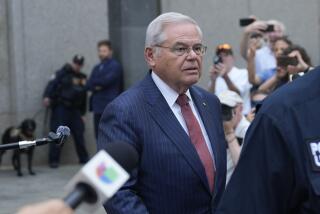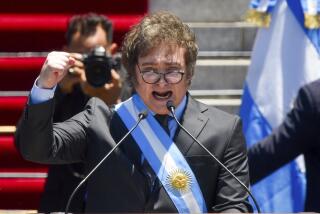Argentine Chief to Quit; Successor Balks
- Share via
BUENOS AIRES — Argentine President Raul Alfonsin announced Monday night that he will resign June 30, five months before his term expires, to allow his Peronist successor to begin confronting an unprecedented economic crisis.
However, President-elect Carlos Saul Menem indicated early today that he might not accept the quick handover, calling Alfonsin’s announcement “surprising.” Menem huddled with his Cabinet appointees to discuss Alfonsin’s unilateral declaration.
In resolving to step down and hand over power to Menem, Alfonsin said that in light of the severe economic problems facing the country, “any delay will bring greater suffering.”
Rodolfo Terragno, a Cabinet member and confidant of Alfonsin who spent the day negotiating with Menem, said the president-elect believes the June 30 date is “too soon” and that Menem wanted the changeover in early August. Terragno said that opened the possibility that Menem’s brother, Eduardo, who is president of the Senate, would serve as interim president from June 30 until August.
Although Alfonsin portrayed his decision as an act in defense of democracy, his resignation will bring yet another truncated presidential term in a nation with a tradition of military coups and political turmoil since 1930.
This time, however, the presidency will pass not to a military junta but to an elected successor from another party, the first such transition since 1916.
Alfonsin, his fists clenched with tension and softly drumming his desk in the presidential office, said: “The need to preserve the institutions of the republic from the risks of this unique transition and the gravity of the economic situation demands the recognition that we require energetic and immediate solutions.”
Alfonsin’s six-year term was to expire Dec. 10, nearly seven months after Menem’s landslide victory on May 14 over Eduardo Cesar Angeloz, the candidate of the ruling Radical Civic Union. But with hyper-inflation devouring salaries, a range of political, business and labor leaders quickly began calling for a shorter transition period.
Earlier Move Failed
A first attempt at an accord in late May ended when the Justicialist Party, as Peronism is formally known, declined to endorse the lame-duck government’s emergency economic package. Alfonsin then resolved to serve out his term. But an outbreak of food riots and looting resulting in the declaration of a state of siege brought renewed pressure for Alfonsin’s departure.
Alfonsin promised that his Radical party, which dominates the powerful lower house of Congress, will support Peronist economic legislation until December, when the new Congress is sworn in. The Peronists then will have majorities in both the House and the Senate.
The 62-year-old president made no mention of ending trials of military officers accused of human rights violations during the previous dictatorship, which Menem’s negotiators had apparently sought from the outgoing government. The continuing trials were partly responsible for three military uprisings against Alfonsin’s government, and Menem’s advisers have said they want the issue resolved to remove a potential source of conflict.
The Radical government’s second major anti-inflation program, launched last August, collapsed in February setting off a furious inflation binge that ensured Menem’s victory. From single-digit monthly inflation, the rate surged to 78.5% in May, nearly double the previous monthly record in 1976, when the then-Peronist government fell in a military coup. The dollar, worth 17 australs in February, rose to nearly 400 on the black market on Monday.
With virtually no credibility for his economic policies and hampered by his lame-duck status, Alfonsin acknowledged that “the space for the functioning of the current government is very small.”
Menem, governor of La Rioja Province, has named his full Cabinet including an economy minister, Miguel Roig, from one of Argentina’s largest conglomerates, Bunge & Born, but several aspects of his program remain unsettled.
More to Read
Sign up for Essential California
The most important California stories and recommendations in your inbox every morning.
You may occasionally receive promotional content from the Los Angeles Times.










